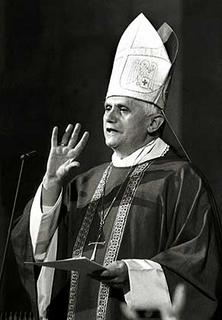
Truth of Christ: beautiful among men, the man of sorrows
"Every year, in the Liturgy of the Hours for the Season of Lent, I am struck anew by a paradox in Vespers for Monday of the Second Week of the Psalter. Here, side by side, are two antiphons, one for the Season of Lent, the other for Holy Week. Both introduce Psalm 44 [45], but they present strikingly contradictory interpretations. The Psalm describes the wedding of the King, his beauty, his virtues, his mission, and then becomes an exaltation of his bride. In the Season of Lent, Psalm 44 is framed by the same antiphon used for the rest of the year. The third verse of the Psalm says: "You are the fairest of the children of men and grace is poured upon your lips". Naturally, the Church reads this psalm as a poetic-prophetic representation of Christ's spousal relationship with his Church. She recognizes Christ as the fairest of men, the grace poured upon his lips points to the inner beauty of his words, the glory of his proclamation. So it is not merely the external beauty of the Redeemer's appearance that is glorified: rather, the beauty of Truth appears in him, the beauty of God himself who draws us to himself and, at the same time captures us with the wound of Love, the holy passion (eros), that enables us to go forth together, with and in the Church his Bride, to meet the Love who calls us."
"On Monday of Holy Week, however, the Church changes the antiphon and invites us to interpret the Psalm in the light of Is 53,2: "He had neither beauty, no majesty, nothing to attract our eyes, no grace to make us delight in him". How can we reconcile this? The appearance of the "fairest of the children of men" is so wretched that no one desires to look at him. Pilate presented him to the crowd saying: "Behold the man!", to rouse sympathy for the crushed and battered Man, in whom no external beauty remained."

No comments:
Post a Comment